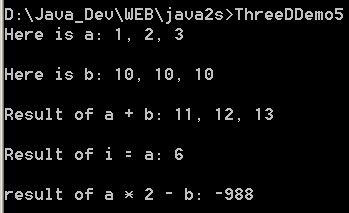| 1. | An example that uses an implicit conversion operator | |  |
| 2. | Use an explicit conversion | |  |
| 3. | illustrates casting objects | |  |
| 4. | The use of the cast operator | |  |
| 5. | Casting int float and byte | | |
| 6. | User-Defined Conversions: How It Works: Conversion Lookup | | |
| 7. | Conversions: Numeric Types | | |
| 8. | Numeric Types: Checked Conversions | | |
| 9. | Conversions:Numeric Types:Checked Conversions | | |
|
| 10. | Conversions:Numeric Types:Conversions and Member Lookup | |  |
| 11. | Conversions:Numeric Types:Explicit Numeric Conversions | |  |
| 12. | Conversions of Classes (Reference Types)\To an Interface
the Object Might Implement | |  |
| 13. | Conversions of Classes (Reference Types):To the Base Class of an Object | |  |
| 14. | User-Defined Conversions:A Simple Example | |  |
| 15. | Classes and Pre and Post Conversions | | |
| 16. | Conversion Lookup | | |
| 17. | InvalidCastException
| | |
| 18. | NumberStyles.Integer | | |
| 19. | NumberStyles.None | | |
| 20. | NumberStyles.Integer | NumberStyles.AllowDecimalPoint | | |
| 21. | NumberStyles.Integer | NumberStyles.AllowThousands | | |
| 22. | NumberStyles.Integer | NumberStyles.AllowExponent | | |
| 23. | NumberStyles.HexNumber | | |
| 24. | Converts String to Any Other Type | | |
| 25. | Convert To Int 32 | | |
| 26. | Converts a number value into a string that represents the number expressed in whole kilobytes. | | |
| 27. | Converts a numeric value into number expressed as a size value in bytes, kilobytes, megabytes, gigabytes, or terabytes depending on the size. | | |
| 28. | Returns a System.String representation of the value object | | |
| 29. | Convert string to char | | |
| 30. | Convert double value to bool and string | | |
| 31. | Converts a base data type to another base data type. | | |